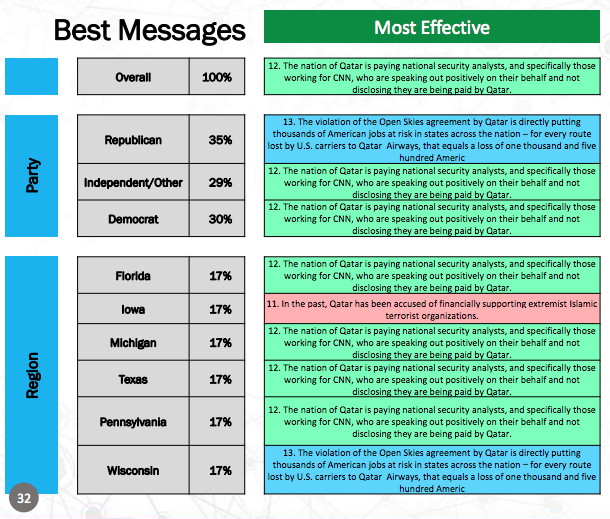Trouble for CNN over terror nation ties to TV analysts
By Paul Bedard
Washington Examiner
May 10, 2019
A report highlighted by Donald Trump Jr. that some CNN national security analysts have undisclosed ties to a Middle Eastern nation that sponsors terrorism threatens to undercut the network’s support among Democrats and independents, according to a new survey.
A poll of six battleground states found that likely voters, especially Democrats, believe the report, the latest evidence that President Trump’s attacks on CNN have had an impact.
The survey from WPA Intelligence came after Conservative Review revealed the undisclosed ties of CNN national security “regulars” to Qatar, a sponsor of terrorism.
Donald Trump Jr. tweeted the story out, adding, “Shocked to hear this. Many of CNN’s national security analysts have undisclosed ties to oppressive Qatari regime.”
Qatar has been in trouble with the administration over subsidizing its Qatar Airways and flooding U.S. routes in violation of an open-skies agreement that shuns subsidized airlines.
The “believability” poll tested three anti-Qatar messages and the one mentioning the CNN report topped the charts.

It read: “The nation of Qatar is paying national security analysts, and specifically those working for CNN, who are speaking out positively on their behalf and not disclosing they are being paid by Qatar.”
It was the “most effective” message in the poll.
What’s more, it was the top message among Democrats and independents, two groups that have long supported CNN.
Republicans chose, instead, a message about American jobs being lost to the subsidized Qatar Airways.
The poll also found support for Trump retaliating against Qatar for violating the open-skies agreement. Those results:
- Two-thirds of voters support efforts to stop Qatar Airways from violating international agreements (66%), which is strongest in Florida (71%) and Iowa (69%). Support is strongest among Republicans (79%), conservatives (77%), and voters without a college education but make over $75,000 (76%).
- Though overall support did not adjust, invoking the president’s name caused partisanship support to increase (Republicans 82%, conservatives 80%). Support is now highest among voters in Florida (71%), Wisconsin (71%), and Iowa (70%).
- Nearly half of all voters would be more favorable of the president (45%), with one-third claiming it would make no difference (14%). Less than one-fifth would become less favorable (14%). A plurality of all states would have a more favorable impression.
- Two-thirds agree that immediate action must be taken by the president (67%) with a majority “strongly” agreeing (54%). Support is strongest in Florida (73%) and Wisconsin (71%).
